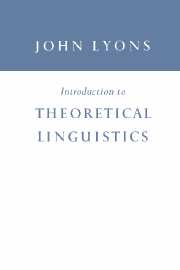Book contents
- Frontmatter
- Contents
- PREFACE TO THE 1995 EDITION
- 1 Linguistics: The Scientific Study of Language
- 2 The Structure of Language
- 3 The Sounds of Language
- 4 Grammar: General Principles
- 5 Grammatical Units
- 6 Grammatical Structure
- 7 Grammatical Categories
- 8 Grammatical Functions
- 9 Semantics: General Principles
- 10 Semantic Structure
- Notes and references
- Addenda
- Bibliography
- Table of symbols and notational conventions
- Index of proper names
- Index of subjects
- Frontmatter
- Contents
- PREFACE TO THE 1995 EDITION
- 1 Linguistics: The Scientific Study of Language
- 2 The Structure of Language
- 3 The Sounds of Language
- 4 Grammar: General Principles
- 5 Grammatical Units
- 6 Grammatical Structure
- 7 Grammatical Categories
- 8 Grammatical Functions
- 9 Semantics: General Principles
- 10 Semantic Structure
- Notes and references
- Addenda
- Bibliography
- Table of symbols and notational conventions
- Index of proper names
- Index of subjects
Summary
Introductory
The term ‘category’ in traditional grammar
So far we have adopted a purely ‘formal’ approach to grammatical analysis. In the present chapter we will discuss the traditional assumption that there exist certain ‘notional’ categories which are universal in the sense that they are common to all languages (cf. 4.1.3, 4.2.9). In particular, we shall be concerned with the traditional theory of the ‘parts of speech’ and such ‘grammatical categories’ traditionally associated with the parts of speech as person, tense, mood, gender, number and case. First of all, something must be said in this introductory section about the term ‘grammatical category’ and its traditional implications.
There is very little consistency or uniformity in the use of the term ‘category’ in modern treatments of grammatical theory. It is frequently employed, like ‘class’ or ‘set’, to refer to any group of elements recognized in the description of particular languages. Some authors refer to the ‘parts of speech’ as ‘categories’; others, following the more traditional usage, restrict the application of the term to such features associated with the ‘parts of speech’ in the classical languages as have been mentioned above (person, tense, mood, etc.). And there are other—wider, narrower or quite different—technical senses in which the term has been employed. No attempt will be made here to give to the term ‘grammatical category’ a precise, technical interpretation.
- Type
- Chapter
- Information
- Introduction to Theoretical Linguistics , pp. 270 - 333Publisher: Cambridge University PressPrint publication year: 1968
- 2
- Cited by

